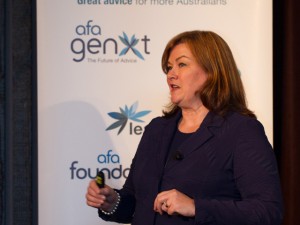In the last edition of riskinfo eMagazine, Elixir Consulting MD, Sue Viskovic, shared the power of saying no to some clients, and being selective about the clientele that you choose to work with. In this follow-up article, Sue provides practical tips for advisers on how to do this…
In all our years of helping advisers to get their businesses performing better, identifying the adviser’s ‘ideal client’ would have to be one of the top three drivers of true success. (And you can’t fully leverage the other two unless you get this one nailed!)
For years I was astounded by the number of advisers we would come across that still did not passionately embrace this concept, and then something occurred to me. In my book Pricing Advice, in our Business Success Wheel and indeed in countless presentations and workshops we’ve delivered, our team talked in terms of ‘ideal client’… maybe we have contributed to the problem! I wondered: does the term ‘ideal’ conjure up thoughts of something that is out of reach? People often refer to ‘in an ideal world’ in the assumption that it doesn’t exist! Have we been subconsciously perpetuating the thought that the ‘ideal client’ shares some elusive fantasy world with fairies and unicorns?

So we now refer to this concept as ‘being selective about the clientele you choose to work with’. It is after all, infinitely achievable, and fits well within the realm of reality for today’s (and tomorrow’s) most successful advice businesses.
How do I define my target market?
The key to mastering this concept is to ensure that you identify a good target market, and be clear on defining them. Choosing to service businesses that manufacture pagers in the 80s might have seen your business go the same way the pager has!
Importantly, do not misconstrue the concept of an ideal client as the need to focus on the high net- worth space. Your niche may be tradies or nurses, engineers or school teachers, medicos or cafe owners. You may also choose to niche by life stage, perhaps aiming to work with young professionals wanting to get control of their finances and buy their first home, or business owners with two or more partners looking to lock down their succession plans and protect one another’s families. Whichever market you choose, you will find that people have similar needs and similar concerns – and you will be able to become an expert on their issues.
Take a moment to really think about the clients you enjoy working with the most. It’s no accident that there will be a particular group of people with whom you connect really naturally and your meetings and work seem to flow easily.
Alternatively, you might find you have a readily-available group of clients accessible through a strong referral relationship. Provided these clients also match the first description, this can be a great strategy to pursue.
If that group of people also has ‘typical’, specific and solvable financial challenges, all the better. A very rough rule of thumb here is that the more complex their challenges are, the deeper your technical knowledge will need to be, the less specialists there will be to service them (less competition), the greater fees they will pay, the less clients you will service, and usually, the deeper relationships you will have with those you take on.
If you are aiming to build a business that generates recurring revenue from clients who will be deeply engaged and connected with you, then you’ll also look for clients for whom you can continue to add value well beyond your initial piece of advice.
Can I have more than one target market?
It is possible for a business to effectively service a range of different client types, provided that the business designs a service offering and a pricing model to suit.
For all of the reasons detailed in this article series, it is likely that for this strategy to be successful, a business will need to be of a size that is large enough to manage a range of different marketing strategies, skill sets, product suites, and indeed have the administrative capacity to handle the implementation of this range of services and pricing applications.
you will be servicing clients more effectively if you can get your specialised experience into the hands of those who will benefit most from it
It is also not unusual for the targeted clientele of a business to evolve over time. The young clients you service today will have changing needs as they go through different life stages. You may choose to keep your business small and evolve your skills and knowledge to keep up with their growing needs (as you too might be experiencing the same life events), or you might grow your practice and put on additional advisers to take care of the new clients that your marketing engine continues to attract, while you stay servicing the clients who have been with you for years.
What if my current client base only has a small percentage of my new target clients in it?
When you start out in business, it is quite typical to want to take on anyone with a heartbeat – you are trying to build cash-flow and you’re prepared to take on anybody that you can make some money from; all business is good business. As you mature and gain more knowledge on what makes a great business, you’ll find that you no longer want to spend time with just anyone, knowing that you will be servicing clients more effectively if you can get your specialised experience into the hands of those who will benefit most from it. If you are desperate to get every client that walks through the door you are not making good long term decisions for your business, and you will risk staying so busy with non-profitable clients that you’ll never have the time to think through how to get off that mouse-wheel.
Don’t be too concerned if the description of your targeted clientele does not match your current typical client. If you’ve built your business on commissions (as most have) there will be many people on your books who are not clients – they are customers. They didn’t buy advice from you; they bought a product, and they didn’t care at the time how you were paid for providing them with that product. Indeed, if you were charging a fee at the time they joined you, they probably wouldn’t have joined you. Don’t confuse a customer who purchases a product with a client who is seeking advice, who sees value in that advice, and is prepared to pay for it.
Of course, it will be important to devise a strategy to service those clients, and there is quite a range of options developing in the market. You might choose to sell your non-ideal clients and re-invest that capital into your education and/or marketing budget. The first place you’ll want to go for this is your licensee and/or the product provider, as both of these groups will likely have other advisers who would be keen to service these clients.
With valuation models for ‘passive customer books’ reducing, you might find a more effective model is outsourcing your reviews to a group who will actively contact them and arrange for you to meet with only those within that group who require your personalised service.
Or a great new alternative is to talk with the team at Caboodle, who will take over servicing these customers (and do it very well), and share the revenue with you for ten years, also referring them back to you if and when they need more complex advice.
Many advisers are surprised by just how much time they (and their staff) save by not servicing what is often a large number of people who make up a small percentage of their overall revenue. Despite the fact that they may not offer an active review service, the amount of administrative time involved to manage those customers is often overlooked.
Before you decide to take on that extra staff member, look closely at whether they’re needed to help service non-profitable customers, or if they are an investment in assisting you to provide meaningful advice and services to a targeted group of clients who will appreciate and benefit from your expertise.
Regardless of the option you choose to service your current group of customers who don’t fit with your future vision, it is imperative to have a clear plan for how to replace these customers with people who fit your new definition of clientele.
If you are faced with the task of rebuilding an established business, make this commitment to insure the future of your business – it might take some retraining and you might need to make some initially uncomfortable decisions, but it will be well-worth it in the long run!
And if you have the benefit of business youth on your side, start your business as you mean to go on, so that you don’t build your own problem in future. Rather, build a legacy of outstanding services to appreciative clients who get true value from your expertise.

In Practice Management, Elixir Consulting shares strategies for building better advice businesses.
Sue Viskovic is the Managing Director and founder of Elixir Consulting, a specialist consulting and coaching firm that is dedicated to helping financial advisers and risk specialists to get their businesses performing better.
Contact or follow the author: Website | Twitter | Facebook | YouTube
















